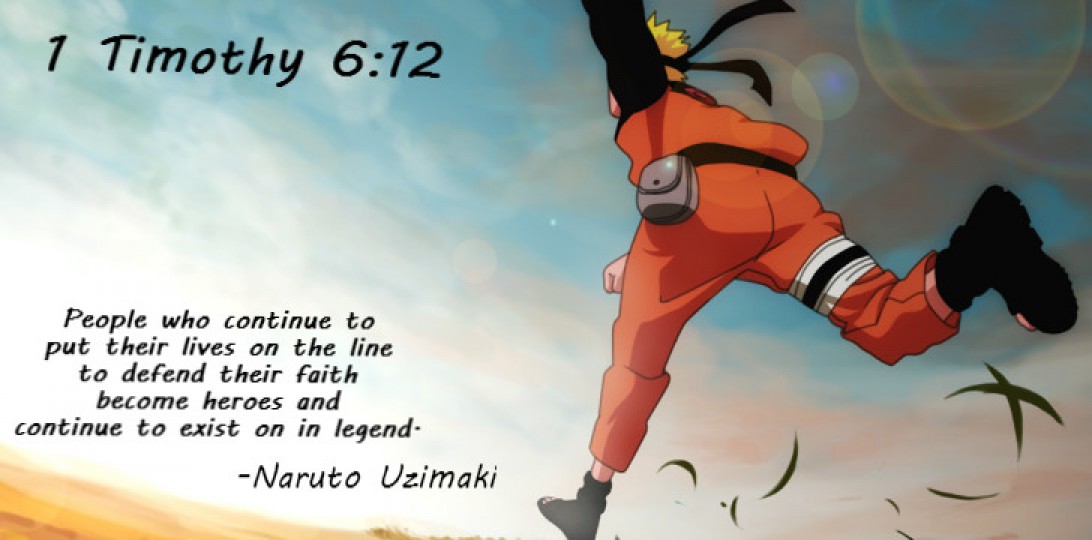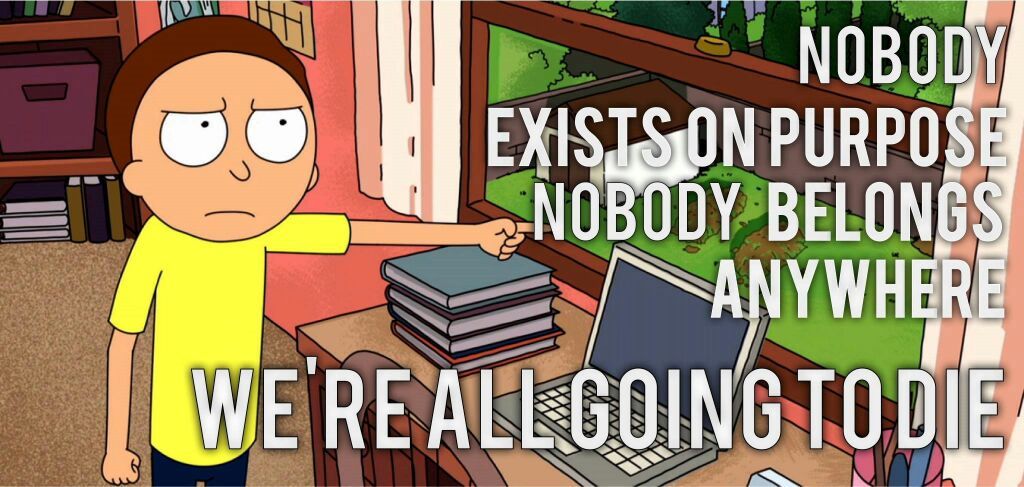~ Existentialism in Popular Animated Television ~
~ Final Blogpost by: Logan Seitz H01 ~
12-2-21
For my mid-term presentation, I attempted to define the existentialist movement through surveying the philosophy of those who are accredited as being its founding fathers. In summary, I determined existentialism to be the philosophical movement that seeks to inspire individuals to live a conscious, introspective life in order to find their own purpose and meaning. In this post, I will seek to identify and analyze examples of television and film that contain existentialist themes.
*[Spoilers Incoming]*
Bojack Horseman:
Though on the surface Bojack Horseman may seem like light-hearted cartoon about talking animals, it is actually a fairly heavy and philosophically deep cartoon about talking animals. It goes beyond the superficial raunchiness and swear-reliant humor that is sometimes expected of an adult cartoon, and it utilizes its mature content as a necessary instrument through which it conveys existentialist themes relevant to the human condition in the 21st century.
Bojack is the main character, and even though he is famous and wealthy, he cannot find happiness. The series follows his quest (or lack thereof) for meaning and happiness along with his fellow characters. This quest for meaning in a reality where the characters are all very vocal about their belief that there is no inherent meaning to their existence is the underlying premise of the series. This gives rise to all sorts of more specific existential themes to arise: including radical freedom, suicide, escapism, leap of faith, bad faith, and facing the absurd.
Radical freedom plays a large role in Bojack Horseman because the main characters all have their basic needs met. Due to their lack of financial poverty, they have an abundance of free time with which they get to choose what to do in order to stave of existential dread. Bojack typically is depicted wasting as much of his time as possible through use of narcotics and casual sex along with other activities he likely doesn't remember. He hates the fact of radical freedom because he continues to make choices that simply avoid the problem of his emptiness rather than solve it. He finds it hard to accept the fact that he is responsible for his own actions because he is considered a bad person. This is likely why he says, ""Hey, I stand by my critique of Sartre. His philosophical arguments helped tyranical regimes justify overt cruelty." He prefers to misinterpret Sartre because he would prefer to believe that Sarte's Existentialism excuses immoral behavior.


Naruto:
The television show Naruto follows a young group of ninja's who search for their "ninja way." In the world of Naruto, "ninja way" is essentially the path they choose for themselves that they ascribe to be meaningful. They are students to older more experienced ninjas who influence their views on the ninja way which is analogous to our situation in the real world; we too have teachers and elders who influence our views on purpose and meaning. There is a certain ninja way that is pushed and expected by the culture they have grown up in that echoes that of 20th century America; do what the government and religion tell you to without question.
The main protagonist Naruto, however, challenges these predefined values in true existentialist fashion. He takes a self-motivated path of introspection because he feels responsible for the decisions he makes. Even though he is expected to carry out orders without question, he is very rebellious and follows his own moral compass just as the existentialist philosophers would suggest. Naruto refuses to be objectified as a mercenary, and he only fights for causes he believes in. This happens as a result of a near death experience on his first mission where his comrades and he had to fight a ninja they respected at the order of someone whom they did not respect initially. Naruto essentially realized that he was living in what Sartre would call "bad faith," and he makes a promise to himself that he will never do so again.

The antagonists of the series all have back-stories that lead them to their path as well. The motivator behind the villains of the series tends to be power, vengeance, or hate. There are two different occasions in the series though where this isn't the case. On these two occasions, the "bad guys" aren't actually all that bad themselves, but rather, they devote their lives to someone who is. One of them is Haku, and the other is Ronmaru. These characters attempt to fill the existential void by serving the person who has saved them regardless of what they are asked. For Haku, this person is Zabuza, and for Ronmaru this person is Ryga. The rational here is that before they were saved, their life was meaningless, but this person has offered them a purpose which gives their life meaning. The implications of this are that Haku and Ronmaru prefer to serve an evil cause for meaning rather than have no purpose at all. This is representative of how cult leaders can take advantage of naive young people who are searching for a purpose, and large groups can be convinced to commit atrocious acts because they are convinced it is bringing their life meaning serving a purpose above themselves. Ultimately, these two characters would likely be considered to have committed philosophical suicide or be in bad faith.
Rick and Morty:
Rick and Morty is about a narcissistic drunk genius who goes on adventures through the multiverse with his grandson. Rick is such a genius that he has essentially god-like power due to his technology. His intelligence and ability offer him the time and awareness to contemplate the meaninglessness of life. He fills the void through substance abuse and intergalactic adventures which are often very dangerous.
The writers refer to existentialism through various creations of Rick's as well. One example of this are the Meeseeks: artificial life forms who are summoned by the user for one purpose and then they die after completing that purpose. When a group of meeseeks are left without purpose for a few minutes they riot over their desire to die because they have not fulfilled their purpose yet. The Meeseeks are another example of Sartre and Bouvoir's "bad faith" because they cannot comprehend existing for more than 5 minutes without a purpose ascribed to them by another. There is another brief example of one of Rick's creations bing aware of the absurdity of their situation in a family breakfast scene. He creates a tiny robot that asks rick its purpose. Rick replies, "You pass butter." The tiny robot lowers his head and moans in existential agony, "ohhhhh."

Another big existential them of Rick and Morty is Absurdity. Absurdity in the sense that the universe is very strange, and it doesn't care what happens. Throughout the many universes Rick and Morty visit lots of terrible things happen. Morty ofter tries to intervene and do "the right thing," but it inevitably backfires to turn a bad situation worse. The vastness and unforgivingness of the multi-verse is one of the major themes of Rick and Morty, and this plays an important role in developing both characters.

"I determined existentialism to be the philosophical movement that seeks to inspire individuals to live a conscious, introspective life in order to find their own purpose and meaning"-- that definition's a little broad. Many non-existential philosophies can be similarly described. On the other hand, no existentialist philosophies prior to Bojack could have been articulated by an animated horse.
ReplyDeleteI walk up a hill by my house everyday--so do my dogs--but it never feels absurd or Sisyphean.
The only Rick and Morty episode I ever watched was the "You pass butter" episode. It was enough.